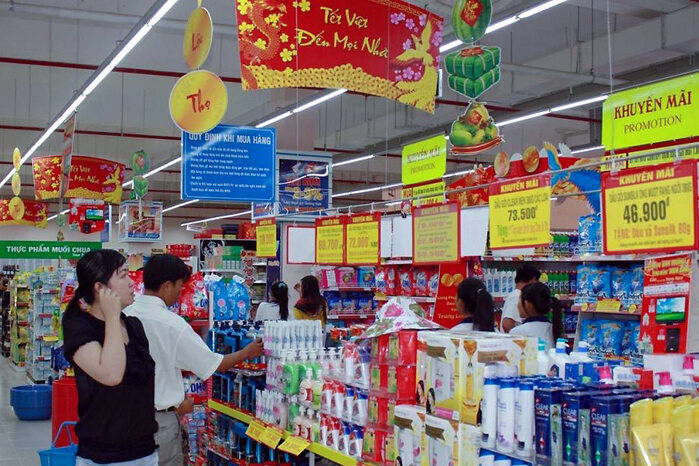
Permanent member of the Party’s Secretariat Vo Van Thuong has signed the Secretariat’s Instruction No 03 on strengthening the Party’s leadership over the ‘Buy Vietnamese’ campaign in new conditions.
Though the ‘Buy Vietnamese’ campaign has been well known for many years, the document says in order to step up the implementation of the campaign, the Secretariat asks to further heighten the responsibility of Party committees and Party organizations in leading and guiding the organization of the campaign, emphasizing that this is an important and regular task.
The Party mentioned the responsibility of cadres and Party members, especially the heads of agencies, to set an example in using Vietnam-made products. The agencies and institutions using the state budget have to prioritize using Vietnam’s goods and services in compliance with international commitments and Vietnamese laws.
Improving goods quality
“Only when improving the quality of products and reducing product prices will Vietnamese manufacturers be able to attract customers,” said Dang Vu Chu, former Minister of Light Industry and Minister of Industry.
He mentioned the story of 30 years ago when Vietnamese producers struggled with China in consumer goods manufacturing.
In early 1992, when Chu was Minister of Light Industry, Chu received a call from Do Muoi, who was then Chair of the Council of Ministers.
“You are Minister of Light Industry and you let the Chinese Liquan beer (Bia Van Luc) reach as far as HCM City and gradually conquer the domestic beer market,” Muoi said with exasperation.
Chu did not have time to reply briefly and clearly about the issue, when Muoi continued with a critical voice: “Not only beer, but Chinese light bulbs and thermos have also been flooding the domestic market. What do you think about this serious thing?”
Chu then gave a brief answer to the question and said he would give a detailed report later.
The Minister and the heads of some agencies then flew to HCM City and had a working session with Sabeco, a Vietnamese-owned beer company.
At that moment, it was very difficult to buy Sabeco and Habeco beer. The products of the companies had high quality, but their output was low. Chinese products with low prices were flooding the domestic market.
After returning to Hanoi, he set up a high-ranking delegation headed by the Minister himself and left for China on a business trip.
The members of the delegation all affirmed that Chinese technology was not better and making high-quality beer was within Vietnamese enterprises’ reach.
The Liquan beer sold well in the Vietnamese market because it was very cheap (they evaded tax), but the quality was not high. The beer was made in an area near the Chinese border with Vietnam. The manufacturer did not have to spend much money to carry beer to Vietnam. This was also an advantage.
Chu also found that Chinese light bulbs and thermos had low prices but low quality, and the products were not durable.
| Vietnam-made goods’ quality and price nowadays are much better than the past. Some products have become so famous that they have been counterfeited by foreign manufacturers. |
The Ministry of Light Industry then decided that factories should borrow capital and import modern production lines with high capacity to expand production to drive the foreign products back.
In the beer industry, Vietnam’s beer yeast is naturally brewed, so it is fragrant and delicious. This great advantage, plus the modern production lines imported from Germany, gave the products high quality with a high output. The production cost also became competitive after several years.
Three or four years later, during a business trip to a northern border province, when Chu went to a restaurant and ordered Chinese beer, the restaurant owner said that Chinese beer was no longer available because the products could not sell.
Meanwhile, Rang Dong Light Source and Vacuum Flask JSC were able to make products better than Chinese products thanks to Japanese technology and machines.
Opportunities for local goods
Chu said that when Vinfast automobile plant became operational, he and former leaders of the industry ministry were invited to visit the plant and test-drive new cars.
Chu, who had visited many foreign automobile plants during his business trips when he was Minister of Industry, felt satisfied about its rapid growth.
He said the Secretariat’s Directive 03 will provide an opportunity for the Vietnam automobile industry to grow.
Are high-ranking leaders of the Party and the State, ministries and branches and local authorities using Vinfast or Truong Hai products? They reportedly have the same quality as imports and the prices are reasonable.
Vietnamese diplomatic agencies and trade representatives overseas should think of using Vietnam-made cars.
According to Chu, the current situation is different from the past. Enterprises have to engage in healthy competition to attract customers. If the quality of products is high and the prices are reasonable, then there should not be too much concern about Vietnamese not using Vietnam-made products.
Quoc Phong

State-financed agencies must give priority to Vietnamese goods
The Secretariat of the Central Committee of the Communist Party of Vietnam has promulgated Directive 03, which has requested agencies financed by the State budget to priotize the use of Vietnamese goods.

Digital transformation, online export of Vietnamese goods steps up
Digital transformation offers great opportunities for Vietnamese businesses to participate in global supply chains and take advantage of innovative solutions and technologies.
